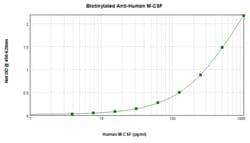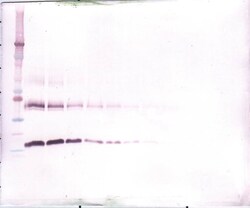Learn More
M-CSF Polyclonal Antibody, Biotin, PeproTech®, Invitrogen™ 
Rabbit Polyclonal Antibody
$337.00 - $432.00
Specifications
| Antigen | M-CSF |
|---|---|
| Concentration | 0.1-1.0 mg/mL |
| Applications | ELISA, Western Blot |
| Classification | Polyclonal |
| Conjugate | Biotin |
| Catalog Number | Mfr. No. | Quantity | Price | Quantity | |||||
|---|---|---|---|---|---|---|---|---|---|
| Catalog Number | Mfr. No. | Quantity | Price | Quantity | |||||
500P44BT25

|
Thermo Fisher Scientific
500P44BT25UG |
25 μg |
Each for $337.00
|
|
|||||
500P44BT50

|
Thermo Fisher Scientific
500P44BT50UG |
50 μg |
Each for $432.00
|
|
|||||
Description
AA Sequence of recombinant protein: MEEVSEYCSH MIGSGHLQSL QRLIDSQMET SCQITFEFVD QEQLKDPVCY LKKAFLLVQD IMEDTMRFRD NTPNAIAIVQ LQELSLRLKS CFTKDYEEHD KACVRTFYET PLQLLEKVKN VFNETKNLLD KDWNIFSKNC NNSFAECSSQ GHERQSEGS. Preparation: Produced from sera of rabbits immunized with highly pure Recombinant Human M-CSF. Anti-Human M-CSF-specific antibody was purified by affinity chromatography and then biotinylated. Sandwich ELISA: To detect hM-CSF by sandwich ELISA (using 100 μL/well antibody solution) a concentration of 0.25-1.0 μg/mL of this antibody is required. This biotinylated polyclonal antibody, in conjunction with PeproTech Polyclonal Anti-Human M-CSF (500-P44) as a capture antibody, allows the detection of at least 0.2-0.4 ng/well of Recombinant hM-CSF. Western Blot: To detect hM-CSF by Western Blot analysis this antibody can be used at a concentration of 0.1-0.2 μg/mL. Used in conjunction with compatible secondary reagents the detection limit for Recombinant hM-CSF is 1.5-3.0 ng/lane, under either reducing or non-reducing conditions. 500-P44BT-1MG will be provided as 2 x 500 μg
M-CSF (Macrophage colony-stimulating factor, CSF-1) is a survival factor essential for the proliferation and development of monocytes, macrophages, and osteoclast progenitor cells. M-CSF also induces VEGF (vascular endothelial growth factor) secretion by macrophages, thereby mediating mobilization of endothelial progenitor cells and neovascularization. M-CSF is present as several bioactive isoforms that differ in potency and stability. The full-length protein is synthesized as a membrane-spanning protein that can be expressed on the cell surface or further cleaved and modified in the secretory vesicle. Further, M-CSF is a disulfide-bonded homodimer which is processed into one of two isoforms, a glycoprotein or a proteoglycan that has been modified by the addition of chondroitin sulfate to each subunit. Binding of M-CSF to its receptor, c-Fms (CSF-1R or CD115) induces dimerization of the receptor followed by internalization and degradation of the complex. Functionally, M-CSF is known to stimulate differentiation of hematopoietic stem cells to monocyte-macrophage cell populations in culture. M-CSF acts through the CSF receptor 1. Although human M-CSF shows activity on mouse cells, mouse CSF shows no activity on human cells.Specifications
| M-CSF | |
| ELISA, Western Blot | |
| Biotin | |
| Rabbit | |
| Human | |
| P09603 | |
| 1435 | |
| E.coli-derived Recombinant Human M-CSF | |
| Antigen affinity chromatography | |
| Csf1 |
| 0.1-1.0 mg/mL | |
| Polyclonal | |
| Lyophilized | |
| RUO | |
| PBS with no preservative | |
| C87615; colony stimulating factor 1; colony stimulating factor 1 (macrophage); colony-stimulating factor-1 splice variant; CSF1; CSF-1; Csfm; H-MCSF; lanimostim; macrophage colony stimulating factor 1; macrophage colony stimulating factor alpha; macrophage colony stimulating factor beta; macrophage colony-stimulating factor; macrophage colony-stimulating factor 1; macrophage colony-stimulating factor beta; macrophage-colony stimulating factor alpha; MCSF; MCSF alpha; MCSFBETA; MGC31930; M-MCSF; op; osteopetrosis; Processed macrophage colony-stimulating factor 1 | |
| Csf1 | |
| Primary | |
| -20°C |


